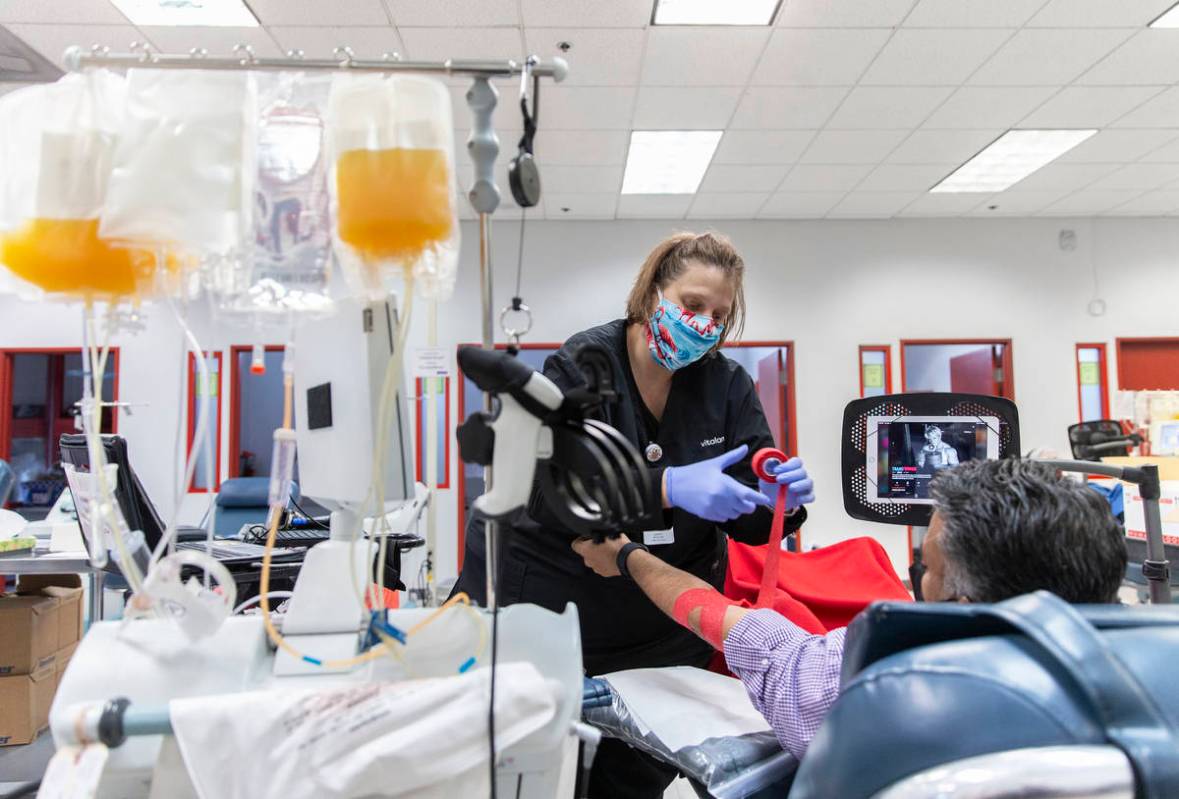2 Las Vegas Valley hospitals using blood plasma to fight COVID-19

Plasma collected from the blood of people who have recovered from COVID-19 is being used to treat those hospitalized with the disease in the Las Vegas Valley.
At least two area hospitals — St. Rose Dominican Hospital, Siena campus in Henderson and Southern Hills Hospital and Medical Center in the southwest valley — began to use the experimental treatment this week as part of a national study.
Plasma, the liquid part of the blood, contains proteins called antibodies, which are produced by the immune system in response to a pathogen such as a virus. The theory is that when the “convalescent plasma” from a person recovered from the new coronavirus is transfused into a patient with an active infection, the antibodies may help the patient fight off the illness.
With no approved treatment for the disease, plasma is being investigated because there is some indication that it might help patients recover, according to the Food and Drug Administration.
More than 1,600 hospitals across the U.S., including the two Las Vegas Valley hospitals, are participating in a study by the Mayo Clinic — the largest of its kind — to provide the “investigational” treatment.
“Researchers hope that convalescent plasma can be given to people with severe COVID-19 to boost their ability to fight the virus,” the Mayo Clinic’s Dr. Michael J. Joyner said in a blog post.
Rose Dominican, Siena spokesman Gordon Absher said it has administered the plasma to only one patient so far, “but with very good results.”
Southern Hills administered the treatment to its first patient on Tuesday. “We have to be humble with this treatment,” said Dr. Christopher Voscopoulos, medical director of the hospital’s intensive care unit. “We’re not sure how well plasma will work.”
However, “it is very reasonable to be optimistic about this because of its track record with other diseases,” he added.
The American Red Cross is helping to supply the plasma for the Mayo Clinic study.
“We’ve done this for a few other diseases throughout history. It has shown to be somewhat helpful,” said Dr. Walter Kelley, medical director for the American Red Cross. Most recently, he said, plasma from recovered patients was used to treat patients with Ebola on a limited basis.
Convalescent plasma also is used to treat rabies and a number of other medical conditions, he said.
At this point, a few hundred doses have been administered in the U.S. as part of the study. “We don’t have the data to show this is helpful yet,” Kelley said, adding that the very early results are promising.
Though it’s too soon to say whether the treatment is effective, “transfusing plasma is a common and safe medical process,” he said.
The immediate goal of the Mayo Clinic research is “to determine if convalescent plasma can improve the chance of recovery for people with the most severe disease,” Joyner said. “A second goal is to test whether convalescent plasma can help keep people who are moderately sick from getting sicker.
“Such a treatment would be a boon for people at high risk — such as with underlying medical conditions, as well as family members and health care workers who have been exposed,” he said.
A spokesman for University Medical Center said the county-run hospital hopes to have the treatment in place in a week to two weeks.
A spokeswoman for the Valley Health System said that its hospitals were “coordinating with their blood partners to provide the treatment.”
Most patients who have recovered from confirmed cases of COVID-19 are eligible to donate plasma, Kelley said. The Red Cross does not collect plasma in the Las Vegas Valley, and it referred potential donors to the AABB (formerly American Association of Blood Banks) website at aabb.org to find the nearest donation center.
Vitalant in Southern Nevada also is partnering with area hospitals to collect and provide plasma to treat COVID-19. For additional information, visit vitalant.org/COVIDfree.
Contact Mary Hynes at mhynes@reviewjournal.com or 702-383-0336. Follow @MaryHynes1 on Twitter.